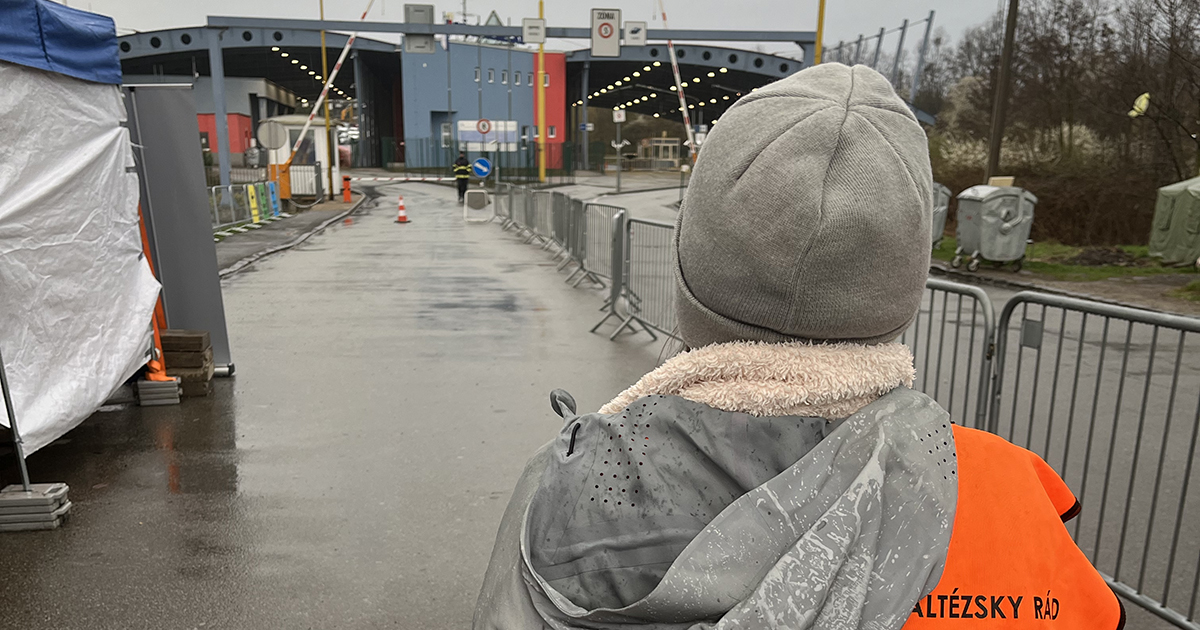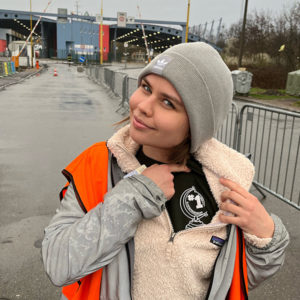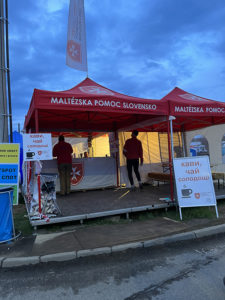My Experience Volunteering on the Ukrainian Border

As mostly women and children crossed the Ukrainian border into Slovakia, I was one of the first faces they saw when coming to a new country. It was hard when you think about how much they had gone through, leaving their homes, and their husbands and fathers, and traveling for days, often on foot, to escape the war. They were tired and scared.
But, as a volunteer at the border, we tried our best to cheer them up, to welcome them to a new country with a smile. As we saw the children, toddlers and teenagers, we’d also give them some солодощі (solodoshchi), which means sweets in Ukrainian.
This was their first interaction in a new country, and I was glad to help brighten their day, even a little bit.
As a member of Babson College’s Class of 2022, I completed my studies in December and will officially earn my degree this week at Commencement. I likely won’t be able to attend the ceremony, because I am currently working in Prague, Czech Republic, for Boston Consulting Group (BCG).
I also have been trying to help refugees fleeing Ukraine, including volunteering on the border with Slovakia, my home country.
The Community Stands Up
Since the war in Ukraine started, we all have been struck by the happenings. At the beginning, we tried our best to collect the materials needed—clothes, food, water, hygiene products, toys for kids, and more. The whole community stood up to help.
Some of my friends in Ukraine, including Babson alumni, have hid in bomb shelters and escaped their homes. Since the beginning, I have been donating food and clothes to local non-governmental organizations (NGO). I also got in touch with my friends to offer some help. I have been trying to find jobs for them and support them in other ways as much as I could. My family also has given accommodations to two Ukrainian families and their kids for free for as long as they need it through Kto pomôže Ukrajine, an NGO that connects refugees with people who can provide temporary accommodations in Slovakia.
Some of my friends in Ukraine, including Babson alumni, have hid in bomb shelters and escaped their homes.
My fiancé, Vojta, drove 23 hours roundtrip from Pilsen, Czech Republic, to the Slovak-Ukrainian border with a Ukrainian woman who needed to get to Odessa to pick up her kids who were hiding in a shelter. He then picked up another family—a mom and two girls under 10—who were waiting at the border and drove them to Brno in the Czech Republic. We had heard that there were many Ukrainian cars stuck at the border without gas. So, for his trip, we bought canisters and gas to donate. We also bought apple puree and Kinder Surprise for the kids—sweets always make a difference.
Although we’re both working full time, we also wanted to volunteer on the border. So, we decided to go over Easter break, when we got some extra time off because of bank holidays, and we left for the border at Vyšné Nemecké with Malteser International.
On the Border
We traveled from Prague by train and car on Friday. When we arrived at the border, we met other volunteers in a tent, and we were assigned a job and schedule. There are two 12-hour shifts, because refugees are crossing through the night as well. We slept in sleeping bags in a former orphanage in a nearby village before our first shift at 6 a.m. Saturday.

Ukrainians were crossing the Slovak border either by car or by foot before being checked by customs. Cars were waiting in line for 30 hours, sometimes more. People on foot waited in a Red Cross tent. Because food and liquids are not allowed over the border by customs, most of the refugees also were thirsty and hungry.
After they went through customs checks with both of the armies, first Ukrainian and then Slovak, they finally crossed the border. They were met by volunteers like us to help carry luggage, which I did on Sunday. Some of the malls provided shopping trolleys, or carts, so we could help escort them to an information stand (for leaflets on accommodations, work permits, etc.) and a food stand (for coffee, tea, food, and warmth). I worked at the food stand all day Saturday and partially Sunday. Refugees then were directed to the bus to transport to the nearest hot spot in Michalovce, where they could find accommodations, food, and clothes for free.
 My experience on the border was a bit grueling—and I don’t mean the physical burden (long days and only five hours of sleep), but mostly the mental burden from the stories of the refugees, who sometimes shared their photos and videos. I met a family escaping from Kharkiv (four women, three generations) who traveled for more than 25 hours by public transport because their home is gone forever. I heard stories about how the outskirts of Kharkiv have the feel of an open-air morgue, where the dead lie unclaimed and unexplained, sometimes for weeks on end, as Ukrainian and Russian forces fight for control of slivers of land.
My experience on the border was a bit grueling—and I don’t mean the physical burden (long days and only five hours of sleep), but mostly the mental burden from the stories of the refugees, who sometimes shared their photos and videos. I met a family escaping from Kharkiv (four women, three generations) who traveled for more than 25 hours by public transport because their home is gone forever. I heard stories about how the outskirts of Kharkiv have the feel of an open-air morgue, where the dead lie unclaimed and unexplained, sometimes for weeks on end, as Ukrainian and Russian forces fight for control of slivers of land.
It was tough to hear. But, what surprised me the most was the children. They were scared in the beginning, but they adjusted quickly. After our shifts, we spotted several kids, less than 2 years old, playing in the hallway. They were smiling and running around as we gathered our last energy after the shift and played catch with them. They were not shy and wanted to play with us. I am happy that they found shelter and they are safe here. No child should ever feel this way or endure such a tough life.
How You Can Help
Even though we’re helping as much as we can, I still feel helpless. Meeting the refugees and hearing what they’ve gone through, it all weighs on me. None of the work my fiancé and I have done is extraordinary; everyone in the region is doing what they can.
You can help, too.
The easiest thing you can do is support the NGOs working on the border. Your financial support has the biggest impact. The storage centers are overflowing with donations of material necessities, but all of the NGOs are lacking financial support to be able to purchase gasoline and other unforeseen needs in the moment.
Even though we’re helping as much as we can, I still feel helpless. Meeting the refugees and hearing what they’ve gone through, it all weighs on me.
Also, your contribution will have a much greater impact if you donate to small NGOs operating here locally on the border. Here, I have handpicked NGOs—mostly from Slovakia and neighboring countries—that I have seen in person helping on the borders or contributing directly:
- Order of Malta Slovakia — Providing food, shelter, information, and help upon arrival at the border.
- United 24 — Launched by Ukraine President Volodymyr Zelenskyy as the main venue for collecting charitable donations in support of Ukraine. Funds will be transferred to the official accounts of the National Bank of Ukraine and allocated by assigned ministries to cover the most pressing needs: defense and demining, medical aid, and rebuilding Ukraine.
- Kto pomôže Ukrajine — Covering multiple forms of support, assistance, and aid for people impacted by the war in Ukraine and forced to flee to Slovakia.
- Scouts — Helping to coordinate logistics at the border, and providing shelter and material help for refugees.
- The $1k Project Ukraine — Matches donors with a family from eastern Ukraine and helps the family directly.
- Help Ukraine Win — Raising funds to provide essential supplies to the Ukrainian people.
- UA SOS — Helps to find shelter for the victims of the war in Ukraine.
Posted in Community






